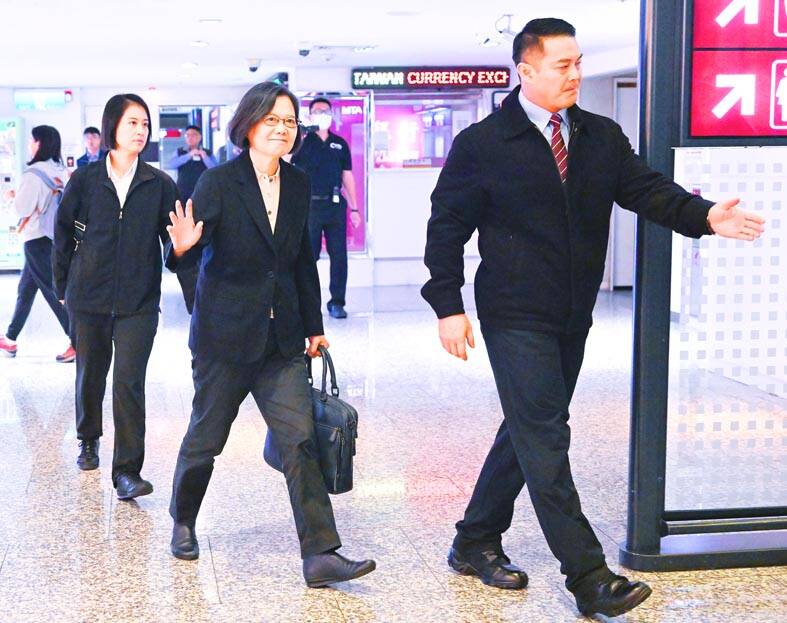Former president Tsai Ing-wen (蔡英文) plans to visit Canada next week, two diplomatic sources said.
Tsai, whose second term ended in May, is to visit Nova Scotia and deliver a speech at the Halifax International Security Forum, which begins on Friday next week, two diplomatic sources told Reuters, speaking on condition of anonymity given the sensitivity of the matter.
Tsai’s office said that if details of travel plans are confirmed, it would announce them at an appropriate time. It did not elaborate.

Photo: Chu Pei-hsiung, Taipei Times
Neither the Halifax Forum nor Canada’s Global Affairs department had responded to requests for comment sent outside of Canadian office hours.
The Chinese Ministry of Foreign Affairs also did not immediately respond to a request for comment.
Canada has a difficult relationship with China, including accusations by Ottawa about Chinese hacking attacks that Beijing denies, and disputes over human rights and trade.
Tsai’s travel plans to Canada and the forum were first reported by Taiwanese media.
Tsai last month visited the Czech Republic, France and Belgium in a sensitive trip due to concerns about Chinese espionage and harassment.
President William Lai (賴清德) fully supported her European visit, calling her the “best spokesperson” for the nation on the international stage.
Under Tsai’s watch, the government greatly boosted military investment and deepened unofficial relations with major countries including the US and Japan.
Meanwhile, a national security official yesterday declined to confirm media reports that Lai was planning a trip to Taiwan’s South Pacific allies with a stopover in Hawaii as soon as late this month.
The official, who spoke on condition of anonymity, said that the planning of the president’s overseas visits “proceeds according to the original pace” and that “there will be no surprise.”
Any such visit would be “announced when the time is ripe,” they said.
Chinese-language media have reported that Lai was planning to visit the South Pacific late this month or early next month, and would stop over in Hawaii.
Taiwan has 12 diplomatic allies, three of which are in the South Pacific: Palau, Tuvalu and the Marshall Islands.
Speculation about Lai embarking on his overseas visit after taking office in May circulated intermittently for months, with the Presidential Office responding only that “any such arrangements will be reported to the public in due time.”
Despite a lack of formal diplomatic relations, Washington has allowed Taiwanese presidents to make stopovers on US soil during their trips to visit Taiwan’s diplomatic allies.
How they were received in the US was often interpreted by the media as a sign of how Washington wanted to handle its relations with Taipei.
Tsai traveled to allies in the South Pacific twice during her two four-year tenures, in 2017 and 2019.
Her 2017 trip included layovers in Honolulu, Hawaii and Guam.

ENDEAVOR MANTA: The ship is programmed to automatically return to its designated home port and would self-destruct if seized by another party The Endeavor Manta, Taiwan’s first military-specification uncrewed surface vehicle (USV) tailor-made to operate in the Taiwan Strait in a bid to bolster the nation’s asymmetric combat capabilities made its first appearance at Kaohsiung’s Singda Harbor yesterday. Taking inspiration from Ukraine’s navy, which is using USVs to force Russia’s Black Sea fleet to take shelter within its own ports, CSBC Taiwan (台灣國際造船) established a research and development unit on USVs last year, CSBC chairman Huang Cheng-hung (黃正弘) said. With the exception of the satellite guidance system and the outboard motors — which were purchased from foreign companies that were not affiliated with Chinese-funded

PERMIT REVOKED: The influencer at a news conference said the National Immigration Agency was infringing on human rights and persecuting Chinese spouses Chinese influencer “Yaya in Taiwan” (亞亞在台灣) yesterday evening voluntarily left Taiwan, despite saying yesterday morning that she had “no intention” of leaving after her residence permit was revoked over her comments on Taiwan being “unified” with China by military force. The Ministry of the Interior yesterday had said that it could forcibly deport the influencer at midnight, but was considering taking a more flexible approach and beginning procedures this morning. The influencer, whose given name is Liu Zhenya (劉振亞), departed on a 8:45pm flight from Taipei International Airport (Songshan airport) to Fuzhou, China. Liu held a news conference at the airport at 7pm,

Authorities yesterday elaborated on the rules governing Employment Gold Cards after a US cardholder was barred from entering Taiwan for six years after working without a permit during a 2023 visit. American YouTuber LeLe Farley was barred after already being approved for an Employment Gold Card, he said in a video published on his channel on Saturday. Farley, who has more than 420,000 subscribers on his YouTube channel, was approved for his Gold Card last month, but was told at a check-in counter at the Los Angeles International Airport that he could not enter Taiwan. That was because he previously participated in two

SECURITY RISK: If there is a conflict between China and Taiwan, ‘there would likely be significant consequences to global economic and security interests,’ it said China remains the top military and cyber threat to the US and continues to make progress on capabilities to seize Taiwan, a report by US intelligence agencies said on Tuesday. The report provides an overview of the “collective insights” of top US intelligence agencies about the security threats to the US posed by foreign nations and criminal organizations. In its Annual Threat Assessment, the agencies divided threats facing the US into two broad categories, “nonstate transnational criminals and terrorists” and “major state actors,” with China, Russia, Iran and North Korea named. Of those countries, “China presents the most comprehensive and robust military threat